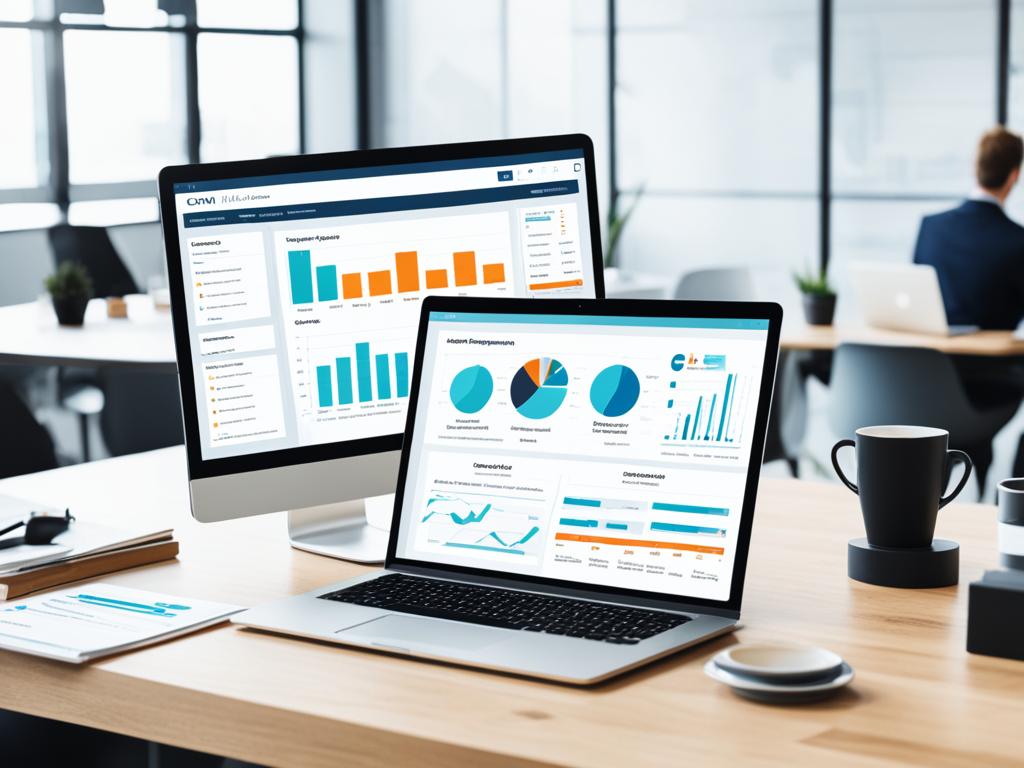When it comes to managing customer relationships and optimizing business processes, two software solutions frequently come into play: ERP and CRM. But do you know the real differences between ERP (Enterprise Resource Planning) and CRM (Customer Relationship Management)? Are they interchangeable or do they serve distinct purposes? Let’s uncover the truth and challenge some common beliefs.
Key Takeaways:
- ERP focuses on automating and connecting back-office functions, while CRM focuses on customer interactions and insights.
- CRM software helps improve customer service, boost customer retention, and increase productivity.
- ERP systems streamline operations, improve decision-making, and reduce costs.
- The main differences between CRM and ERP lie in the areas they focus on: front-office vs back-office functions, customer data vs financial data.
- Integrating CRM and ERP systems can lead to improved business efficiency, centralized data, and streamlined processes.
Understanding Customer Relationship Management (CRM)
CRM software plays a crucial role in automating customer interactions and improving customer service. It enables businesses to track and store valuable customer data, including communications, purchase history, and service requests. By centralizing customer data, CRM systems streamline customer interactions, leading to a more personalized and efficient experience.
But CRM software goes beyond just data management. It utilizes advanced data analysis and AI technology to provide businesses with valuable insights. These insights help improve customer service, boost customer retention, and increase sales. With the power of CRM, businesses can enhance their productivity and achieve better overall performance.
Some key benefits of CRM software include:
- Automating customer interactions
- Improving customer service
- Boosting customer retention
- Increasing productivity
“CRM software enables businesses to automate customer interactions, improve service quality, and boost customer retention.” – [Insert Expert Name], [Insert Company Name]
By automating customer interactions, CRM software allows businesses to efficiently manage sales, marketing, and customer service processes. This automation eliminates manual tasks, reduces human error, and ensures consistent service delivery.
Improved customer service is another key advantage of CRM software. With centralized customer data, businesses can better understand their customers’ needs and preferences, enabling them to provide highly personalized and targeted services. This level of personalized service enhances customer satisfaction and loyalty.
Furthermore, CRM software plays a vital role in boosting customer retention. By analyzing customer data, businesses can identify trends, anticipate needs, and proactively address any issues, thereby strengthening the relationship with their customers.
Lastly, CRM software greatly contributes to increasing productivity. With streamlined processes, businesses can utilize their resources more efficiently, saving time and effort. CRM software also provides automation tools, allowing employees to focus on more strategic activities rather than repetitive tasks.
Boosting Business Performance with CRM
Integrating CRM software into your business operations can have a profound impact on your overall performance. With improved customer service, increased customer retention, and enhanced productivity, businesses can achieve better competitiveness and profitability.

| Benefits | Description |
|---|---|
| Automating customer interactions | CRM software automates repetitive customer-facing tasks, allowing businesses to provide faster and more consistent service. |
| Improving customer service | With centralized customer data and insights, businesses can deliver highly personalized and targeted services, increasing customer satisfaction. |
| Boosting customer retention | CRM software helps businesses identify trends, anticipate needs, and address issues, improving customer loyalty and retention. |
| Increasing productivity | By automating processes and reducing manual tasks, CRM software allows businesses to utilize their resources efficiently, increasing productivity. |
With unmatched capabilities in automating customer interactions, improving customer service, boosting customer retention, and increasing productivity, CRM software is an essential tool for businesses looking to thrive in today’s competitive landscape. By leveraging the power of CRM, businesses can build stronger customer relationships, drive growth, and achieve long-term success.
Exploring Enterprise Resource Planning (ERP)
Enterprise Resource Planning (ERP) software plays a vital role in automating and connecting back-office functions within organizations. It encompasses various areas such as finance, procurement, project management, supply chain management, and human resources.
With ERP software, companies can streamline their operations, improve overall efficiency, and make data-driven decisions. By integrating data from different departments into a centralized database, ERP provides a single source of truth for financial and operational information.
Implementing an ERP system brings numerous benefits to businesses. One of the key advantages is the ability to automate business processes, allowing for smoother and more efficient operations. By automating tasks such as inventory management, order processing, and financial management, companies can reduce manual errors, save time, and increase productivity.
“Implementing an ERP system brings numerous benefits to businesses, including automating business processes, improving decision-making, and reducing costs.”
ERP software also plays a crucial role in improving decision-making within organizations. With access to real-time data and advanced analytics capabilities, companies can make informed decisions based on accurate insights. This empowers organizations to identify trends, predict future outcomes, and take proactive measures to optimize business performance.
Furthermore, ERP systems can help reduce costs by eliminating redundant processes and streamlining operations. By centralizing data and standardizing workflows, organizations can minimize inefficiencies and eliminate duplicate efforts. This not only reduces costs but also improves overall resource allocation and utilization.
Collaboration across different teams and departments is another area where ERP software shines. With a centralized database and standardized processes, employees can collaborate seamlessly and share information in real-time. This promotes cross-functional collaboration and enhances communication, leading to better coordination and teamwork.
Example ERP Benefits:
| Benefits of ERP Software | Explanation |
|---|---|
| Automating Business Processes | Streamlining operations and reducing manual errors. |
| Improving Decision-making | Accessing real-time data and analytics for informed decision-making. |
| Reducing Costs | Eliminating redundancies, optimizing workflows, and resource allocation. |
| Enhancing Collaboration | Promoting cross-functional collaboration and real-time information sharing. |
Overall, ERP software is a powerful tool for organizations looking to optimize their back-office functions. By automating processes, improving decision-making, reducing costs, and enhancing collaboration, ERP systems enable businesses to operate more efficiently and effectively in today’s competitive landscape.
Key Differences Between CRM and ERP
The main difference between CRM and ERP lies in the areas they focus on. CRM systems primarily handle front-office functions such as sales, marketing, and customer service, managing customer interactions and data. On the other hand, ERP systems primarily focus on back-office functions like finance, procurement, and supply chain management, managing financial and resource-related data.
CRM systems are designed to optimize customer relationship management, while ERP systems are designed to streamline resource planning and management. While there may be some overlap in functionalities, CRM and ERP systems serve different purposes and are tailored to meet the specific needs of their respective areas.
CRM systems centralize customer data, providing insights into customer preferences, purchase history, and overall customer journey. This enables businesses to deliver more personalized experiences, boost customer retention, and enhance customer service.
On the other hand, ERP systems integrate and automate various back-office functions such as finance, accounting, human resources, and inventory management. By consolidating financial data and optimizing operational processes, ERP systems improve decision-making, reduce costs, and enhance overall business efficiency.
Integrating CRM and ERP systems can provide comprehensive insights into both customer and financial data, allowing businesses to make data-driven decisions and improve overall performance. This integration enables seamless communication between front-office and back-office functions, ensuring a holistic approach to customer relationship management and resource planning.
In summary, while CRM and ERP systems serve different functions within an organization, their integration can create synergistic benefits. CRM systems focus on optimizing customer interactions and improving customer relationships, while ERP systems streamline and automate back-office functions to enhance operational efficiency. By understanding their key differences and leveraging their complementary capabilities, businesses can achieve a more holistic and effective approach to managing both customer and operational data.

Conclusion
In conclusion, the integration of CRM and ERP systems offers numerous benefits and significantly improves business efficiency. While CRM systems focus on managing customer interactions and providing valuable insights, ERP systems streamline back-office functions and handle financial management.
By integrating CRM and ERP systems, businesses can eliminate data silos and centralize their data, providing a comprehensive view of the customer journey from initial interaction to post-sale support. This centralized data enables businesses to streamline processes, make more informed decisions, and optimize their operations.
The integration of CRM and ERP systems leads to improved productivity, enhanced customer service, and overall better business performance. With streamlined processes and a holistic approach to data management, businesses can respond more effectively to customer needs, drive growth, and stay competitive in today’s dynamic market.

